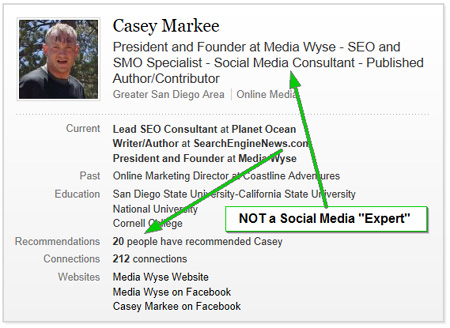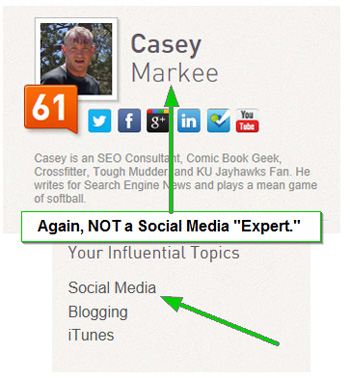Beware of Social Media ‘Experts’
Within the monthly issue of SEN we publish what we call our SE Bytes. These are questions to some of the MANY questions we get asked within our FastTrack service within a month. /we upgrade some of these questions to allow all of our members to learn from the questions. I've gone ahead and wrote a post about one of our recent SE Bytes that really got people talking...
"We've been contacted by purported social media experts to help grow our influence on multiple occasions. However, more than once, the results were terrible and we found out through closer study that all we received were paid Facebook likes or Twitter followers and very little in the way of actual social media assistance. Are there some tips you can provide on how we can recognize a quality provider or company from one that is clearly not?"
It's amazing how many self-titled social media experts are out there these days. If you recall, during one of our presentations we equated the common social media expert with that of seeing a unicorn: it clearly doesn't happen very often.
The best social media professionals don't usually refer to themselves as experts. In fact, many of us here at SearchEngineNews.com will readily admit that although we do social media marketing on a daily basis, it's always shocking to discover how much we DON'T know, and several of us have been training other SEO and social media professionals for years.
In fact, we'd posit the belief that unless OTHERS call someone a social media expert, it should be a flogging offense to refer to yourself as such on your Twitter, Facebook, or LinkedIn profile. As the writer of this article, I'd certainly not refer to myself in that way but, if anyone reading this would like to do so I'd readily accept (just send out a Tweet or Facebook post so there's evidence, thanks).
Clearly, in your case, if your provider's idea of social media marketing was concentrating on generating paid followers to your account then that's a big red flag that they probably don't possess the slightest clue on how to research your target niche, generate engagement, and virally promote your content to a qualified audience.
Fortunately, there do exist several ways to recognize the true social media professional (again, not a big fan of expert here) from the proverbial snake oil salesman, including:
-
1. Check their Twitter Account. It's amazing how many companies or so-called social media experts don't have a Twitter account. Those that do may still have an account that is for all intents and purposes, "fake." Use a free tool like this fake follower tool from Status People. Here's the Twitter account from a not-to-be-named social media expert that shows up prominently in Twitter search:

Now, we don't know about you but if you are going to work with a purported social media expert that offers Twitter follower promotion, it's probably not a good sign when 71% of their own followers are fake. Anything above 5% is ABNORMAL. If you are going to be working with a company/individual in the future, run them through the tool. It's pretty damn accurate.
-
2. Check their LinkedIn Account. If anyone is operating in the social media sphere a LinkedIn profile should be standard. Check their profile for completeness. Have they published their work? Do they have a fully fleshed-out profile with keyword specialties? Are they members of social media groups? More importantly do they have actual client recommendations you can review on their profile?

3. Ask the Right Questions: Noted SEO Ian Lurie of Portent Inc. published a great article containing must-ask questions to evaluate a so-called Social Media Expert. It's a must-read for anyone interviewing either a potential new hire or a new company for outsourced social media work. Simple questions like "how long have you been doing social media?" and "what strategies and techniques would you use to build/promote an audience?" are all no-brainers.
Next, DO NOT be afraid to run the other way if your firm says they "can't disclose their methods because they are proprietary." That's ridiculous. They aren't curing cancer here; they are promoting YOUR accounts online. This is your reputation they have in their hands. If they aren't willing to be 100% transparent with what they are doing to "grow" your influence, you need to look elsewhere!
-
4. What Tools do they use? To be blunt, anyone who tells you that they are not using a tool for social media management is just ignorant! I say ignorant because that can be fixed, stupid is forever. If you are managing multiple client accounts or want any credibility as a social media expert you should be using a professional tool. Personally, we recommend Sprout Social, Viral Heat, or even HootSuite for most clients. These automate a ton of the daily tasks that are necessary for good, successful social media. Make sure to review the following resources on tools, time-management, and social media specifically:
Personally, you cannot throw a rock and not hit a social media management tool. We won't harp on which tool you choose; just choose one. Trust us, it's much easier.
5. Ask for Samples and Recommendations. You wouldn't buy a car without a test drive, would you? How about choosing a school for your kids? You wouldn't do that without first visiting some of the teachers, seeing the facilities or reviewing their recent API scores, right? Don't you think you should do the same thing with your social media efforts?
If you are looking for full social media campaign management do they have a portfolio of past work and projects? Visit their Facebook and Twitter accounts, are they using custom professional backgrounds? Check them out on Klout. Are they listed and if so do they have social media listed as an influential topic?

When we are approached for social media assistance, the above (at the minimum) is how we present ourselves to prospective clients. They've worked out well for us, and we know they will do the same for you.
Remember: social media is a tool. You need to find someone who wields that tool proficiently and can back up their talk with cogent, detailed answers to the above. If not, keep looking!


